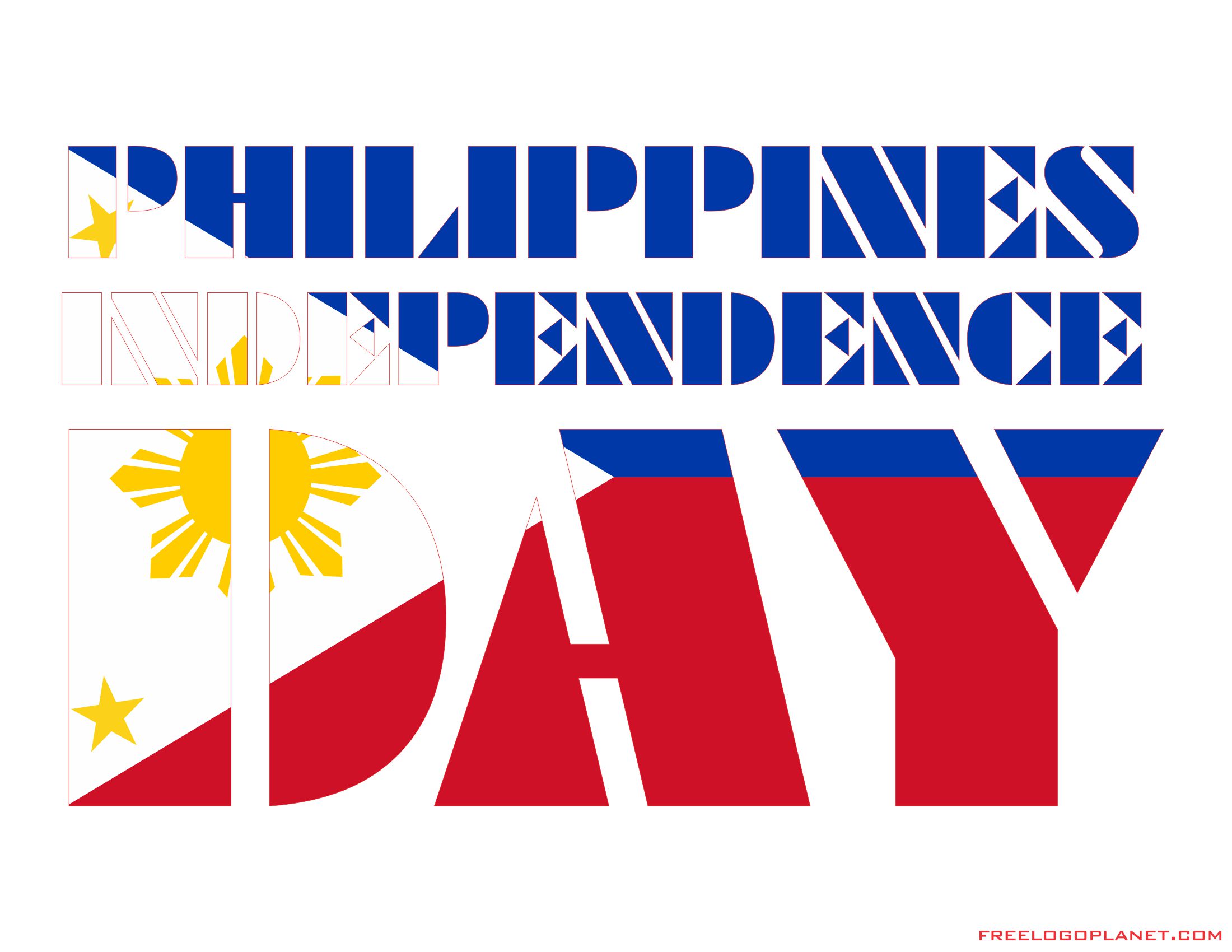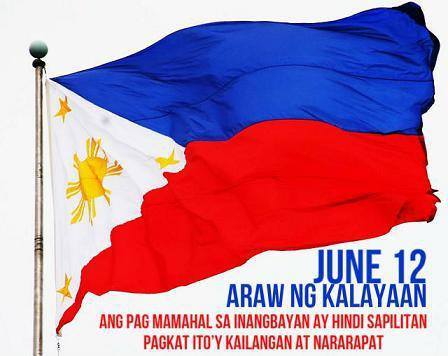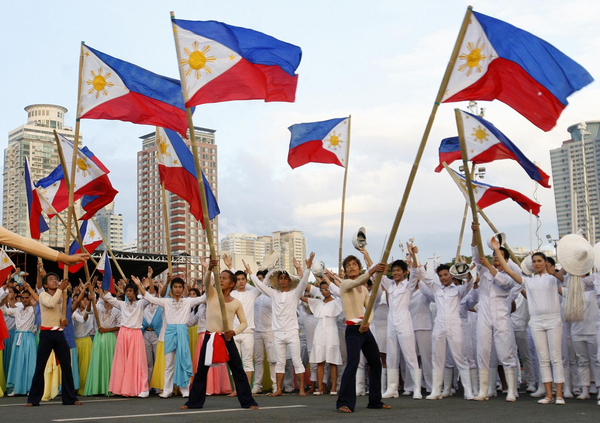
Independence Day (Filipino: Araw ng Kasarinlan; also known as Araw ng Kalayaan, (or "Day of Freedom") is an annual national holiday in the Philippines observed on June 12, commemorating the Philippine Declaration of Independence from Spain on June 12, 1898. Since 1962, it has been the country's National Day. The day of celebration of independence varied throughout the nation's history. The earliest recorded was on April 12, 1895, when Andres Bonifacio, along with Emilio Jacinto, Restituto Javier, Guillermo Masangkay, Aurelio Tolentino, Faustino Manalak, Pedro Zabala and few other katipuneros went to Pamitinan Cave in Montalban, Rizal to initiate new members of the Katipunan. Bonifacio wrote Viva la independencia Filipina! or Long Live Philippine independence on walls of the cave to express the goal of their secret society. Bonifacio also led the Cry of Pugad Lawin, which signals the beginning of Philippine Revolution. Members of the Katipunan, led by Andres Bonifacio, tore their community tax certificates (cedulas personales) in protest of Spanish conquest.

In 1896 the Philippine Revolution began and in December 1897 the Pact of Biak-na-Bato, an agreement between the Spanish colonial government and the revolutionaries, established a truce. Under its terms, Emilio Aguinaldo and other revolutionary leaders went into exile in Hong Kong. At the outbreak of the Spanish–American War, Commodore George Dewey sailed from Hong Kong to Manila Bay leading the Asiatic Squadron of the U.S. Navy. On May 1, 1898, the Dewey defeated the Spanish in the Battle of Manila Bay, effectively putting the U.S. in control of the Spanish colonial government. Later that month, the U.S. Navy transported Aguinaldo back to the Philippines. Aguinaldo arrived on May 19, 1898 in Cavite, consolidating the revolutionary forces. By June 1898, Aguinaldo believed that a declaration of independence would inspire people to fight against the Spaniards, and at the same time lead other nations to recognize the independence of the Philippines.

On June 5, 1898, Aguinaldo issued a decree setting aside June 12, 1898 as the day of the proclamation of independence. Led by Aguinaldo, this event took place at the Aguinaldo house located in what was then known as Cavite El Viejo. The Acta de la Proclamacion de la Independencia del Pueblo Filipino was solemnly read by its author, Ambrosio Rianzares Bautista, Aguinaldo’s war counselor and special delegate. The 21-page declaration was signed by 97 Filipinos, appointed by Aguinaldo, and one retired American artillery officer, Colonel L.M. Johnson. The flag was officially unfurled for the first time at 4:20 p.m, as the Marcha Nacional Filipina was played by the band of San Francisco de Malabon. The proclamation was first ratified on August 1, 1898 by 190 municipal presidents from the 16 provinces controlled by the revolutionary army. It was again ratified on September 29, 1898 by the Malolos Congress. The Philippines failed to win international recognition of its independence, including by the United States of America or by Spain. The Spanish government later ceded the Philippine archipelago to the United States in the 1898 Treaty of Paris. The Philippines Revolutionary Government did not recognize the treaty and the two sides subsequently fought the Philippine–American War.

The United States of America granted independence to the Philippines on July 4, 1946 through the Treaty of Manila. July 4 was chosen as the date by the United States because it corresponds to the United States' Independence Day, and that day was observed in the Philippines as Independence Day until 1962. On May 12, 1962, President Diosdado Macapagal issued Presidential Proclamation No. 28, which declared June 12 a special public holiday throughout the Philippines, "... in commemoration of our people's declaration of their inherent and inalienable right to freedom and independence.[8]" On August 4, 1964, Republic Act No. 4166 renamed July 4 holiday as "Philippine Republic Day", proclaimed June 12 as "Philippine Independence Day", and enjoined all citizens of the Philippines to observe the latter with befitting rites.

 Independence Day (Filipino: Araw ng Kasarinlan; also known as Araw ng Kalayaan, (or "Day of Freedom") is an annual national holiday in the Philippines observed on June 12, commemorating the Philippine Declaration of Independence from Spain on June 12, 1898. Since 1962, it has been the country's National Day. The day of celebration of independence varied throughout the nation's history. The earliest recorded was on April 12, 1895, when Andres Bonifacio, along with Emilio Jacinto, Restituto Javier, Guillermo Masangkay, Aurelio Tolentino, Faustino Manalak, Pedro Zabala and few other katipuneros went to Pamitinan Cave in Montalban, Rizal to initiate new members of the Katipunan. Bonifacio wrote Viva la independencia Filipina! or Long Live Philippine independence on walls of the cave to express the goal of their secret society. Bonifacio also led the Cry of Pugad Lawin, which signals the beginning of Philippine Revolution. Members of the Katipunan, led by Andres Bonifacio, tore their community tax certificates (cedulas personales) in protest of Spanish conquest.
Independence Day (Filipino: Araw ng Kasarinlan; also known as Araw ng Kalayaan, (or "Day of Freedom") is an annual national holiday in the Philippines observed on June 12, commemorating the Philippine Declaration of Independence from Spain on June 12, 1898. Since 1962, it has been the country's National Day. The day of celebration of independence varied throughout the nation's history. The earliest recorded was on April 12, 1895, when Andres Bonifacio, along with Emilio Jacinto, Restituto Javier, Guillermo Masangkay, Aurelio Tolentino, Faustino Manalak, Pedro Zabala and few other katipuneros went to Pamitinan Cave in Montalban, Rizal to initiate new members of the Katipunan. Bonifacio wrote Viva la independencia Filipina! or Long Live Philippine independence on walls of the cave to express the goal of their secret society. Bonifacio also led the Cry of Pugad Lawin, which signals the beginning of Philippine Revolution. Members of the Katipunan, led by Andres Bonifacio, tore their community tax certificates (cedulas personales) in protest of Spanish conquest. In 1896 the Philippine Revolution began and in December 1897 the Pact of Biak-na-Bato, an agreement between the Spanish colonial government and the revolutionaries, established a truce. Under its terms, Emilio Aguinaldo and other revolutionary leaders went into exile in Hong Kong. At the outbreak of the Spanish–American War, Commodore George Dewey sailed from Hong Kong to Manila Bay leading the Asiatic Squadron of the U.S. Navy. On May 1, 1898, the Dewey defeated the Spanish in the Battle of Manila Bay, effectively putting the U.S. in control of the Spanish colonial government. Later that month, the U.S. Navy transported Aguinaldo back to the Philippines. Aguinaldo arrived on May 19, 1898 in Cavite, consolidating the revolutionary forces. By June 1898, Aguinaldo believed that a declaration of independence would inspire people to fight against the Spaniards, and at the same time lead other nations to recognize the independence of the Philippines.
In 1896 the Philippine Revolution began and in December 1897 the Pact of Biak-na-Bato, an agreement between the Spanish colonial government and the revolutionaries, established a truce. Under its terms, Emilio Aguinaldo and other revolutionary leaders went into exile in Hong Kong. At the outbreak of the Spanish–American War, Commodore George Dewey sailed from Hong Kong to Manila Bay leading the Asiatic Squadron of the U.S. Navy. On May 1, 1898, the Dewey defeated the Spanish in the Battle of Manila Bay, effectively putting the U.S. in control of the Spanish colonial government. Later that month, the U.S. Navy transported Aguinaldo back to the Philippines. Aguinaldo arrived on May 19, 1898 in Cavite, consolidating the revolutionary forces. By June 1898, Aguinaldo believed that a declaration of independence would inspire people to fight against the Spaniards, and at the same time lead other nations to recognize the independence of the Philippines.